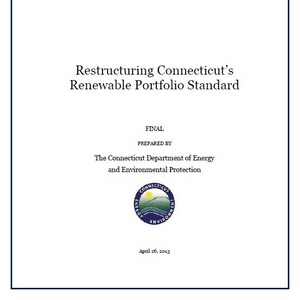Conn. DEEP issues final study on restructuring the state RPS




Connecticut Department of Energy and Environmental Protection
April 29, 2013
BY Erin Krueger
The Connecticut Department of Energy & Environmental Protection has published a final study on the state’s existing renewable portfolio standard (RPS). A draft report was published in March.
According to the Connecticut DEEP, energy legislation passed in 2011 included a requirement that DEEP analyze options for minimizing the cost of electric ratepayers of procuring renewable resources. The analysis was also directed to address the feasibility of increasing the requirements of RPS and to analyze the impacts, costs and benefits of expanding the definition of Class I renewable resources to include hydropower and other technologies that don’t employ nuclear or fossil fuels.
The final study notes that in 2010 a total of 76 percent of Connecticut ratepayers investment in Class I renewable resources supported biomass plants located primarily out of state, in Maine and New Hampshire. An additional 13 percent of the Class I requirement was supplied by landfill gas projects located primarily out of state. The DEEP explains that the energy produced by several of these Class I projects already counts towards New York’s renewable goals, resulting in double counting.
Advertisement
Advertisement
The study calls for a revised state RPS framework by maximizing the benefits associated with a more diverse power supply and improving the reliability of the state’s electric system. It also aims to advanced greenhouse gas and pollution reduction goals while minimizing the costs to ratepayers. In addition, the analysis calls for continuing to support local renewable energy projects that bring jobs and revenue into the state economy.
Several specific recommendations are proposed with the aim of meeting these goals. With regard to biomass, the study calls for a gradual transition away from subsidies for biomass power and landfill gas facilities that don’t provide optimal economic or environmental benefits. Specifically, the DEEP recommends reducing the value of renewable energy credits awarded to these sources in favor of wind, solar and other zero-emissions renewables. However, the study also specifies that the state should be authorized to enter into power purchase agreements with biomass and landfill gas facilities if it determines that their retention provides economic benefit to the state, is in the interest of ratepayers, and furthers the goals of the state’s Comprehensive Energy Strategy and the Global Warming Solutions Act.
In the final report, however, the DEEP does modify the recommendation included in its draft report by stating a phase down of Class I eligibility for biomass and landfill gas should be established in a separate proceeding.
Not all biomass projects fare poorly in the final report. The DEEP does call for expanding support for anaerobic digesters and biologically-derived methane. While Connecticut law currently allows landfill gas to qualify as a Class I resource, that definition has not been extended to biogas produced by other technologies, such as anaerobic digestion. In the study, the DEEP recommends that all methane/biogas that is biologically derived be eligible for Class I status.
Advertisement
Advertisement
According to the final study, the DEEP received many public comments on the biomass components of its draft study. For example, many commenters noted that by pitting biomass power generation against imported large hydropower, the environmental impacts associated with major river diversions, deforestation, and others are significantly larger than the environmental impacts associated with biomass power. The department also received comments against a proposal in the draft report to categorize older biomass plants as legacy facilities, arguing that boiler technology is not materially different when replacing an older facility with a newer one.
A full copy of the DEEP final report can be downloaded from the department’s website.
Upcoming Events





